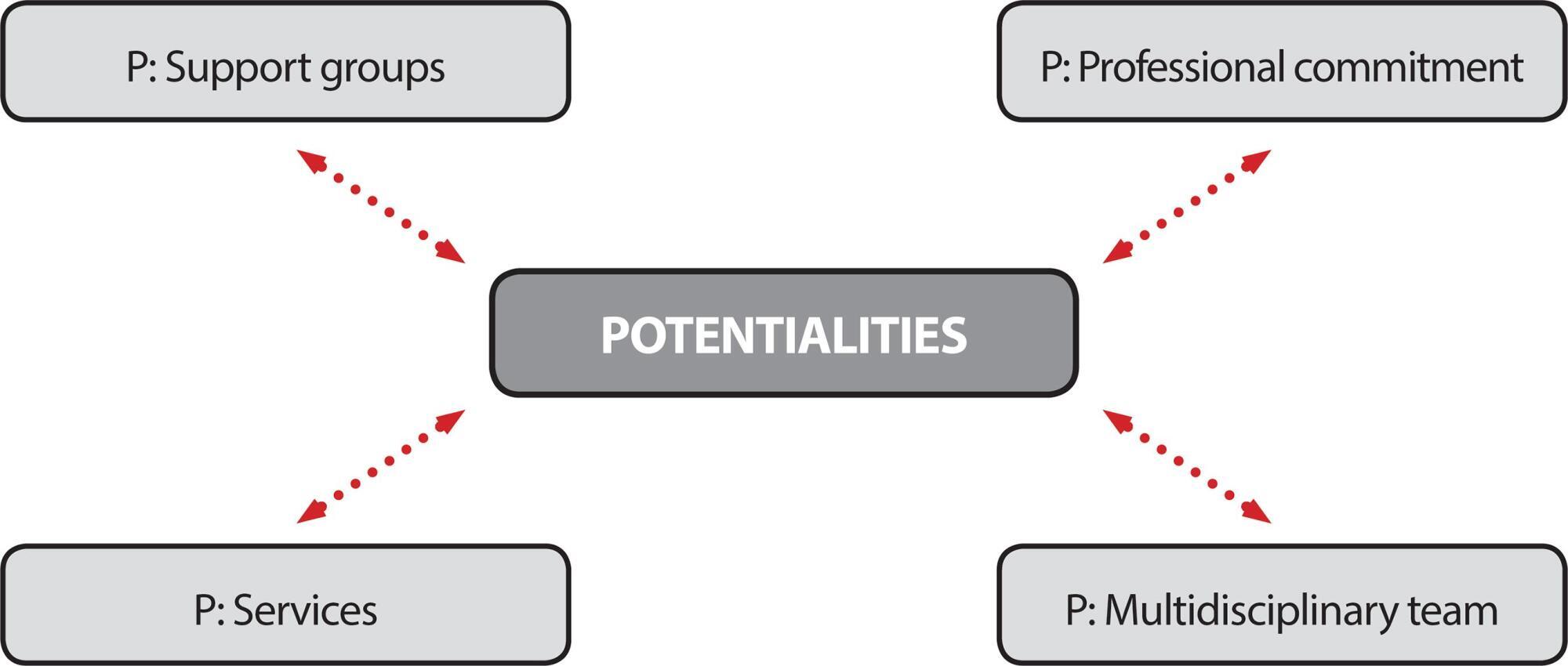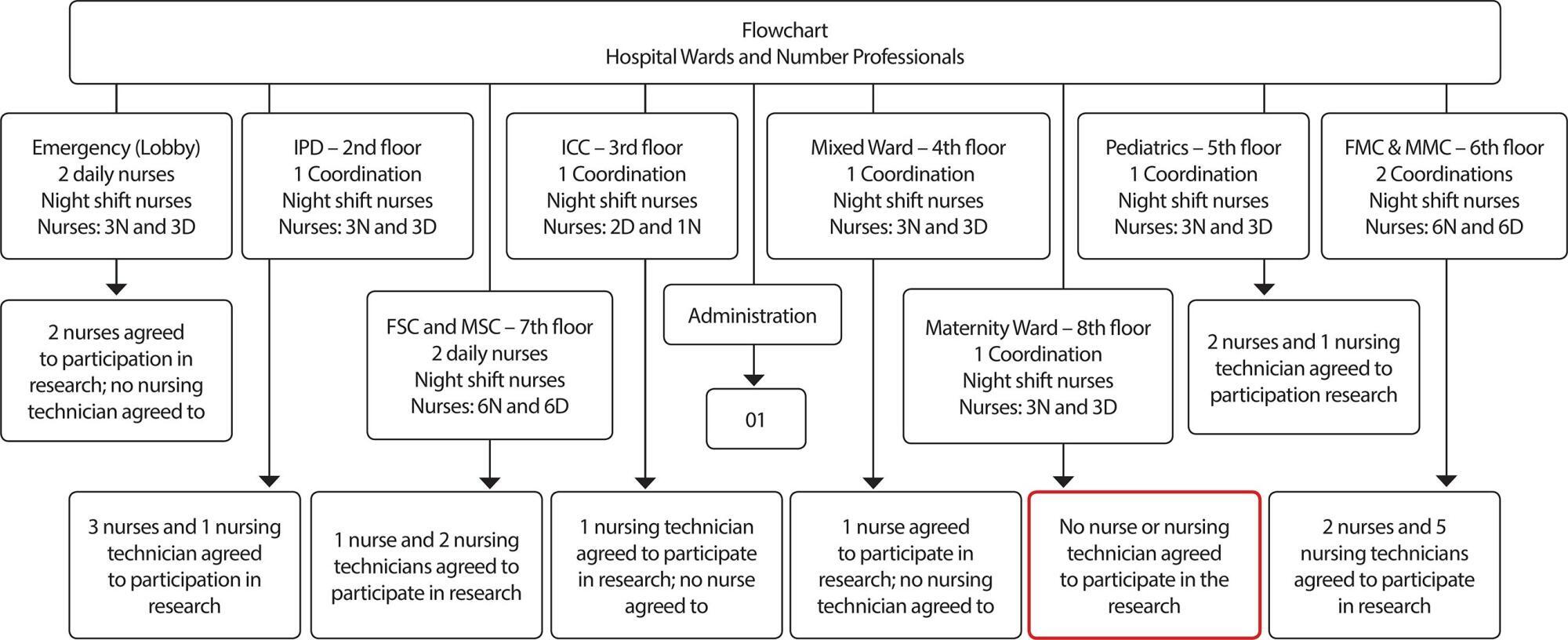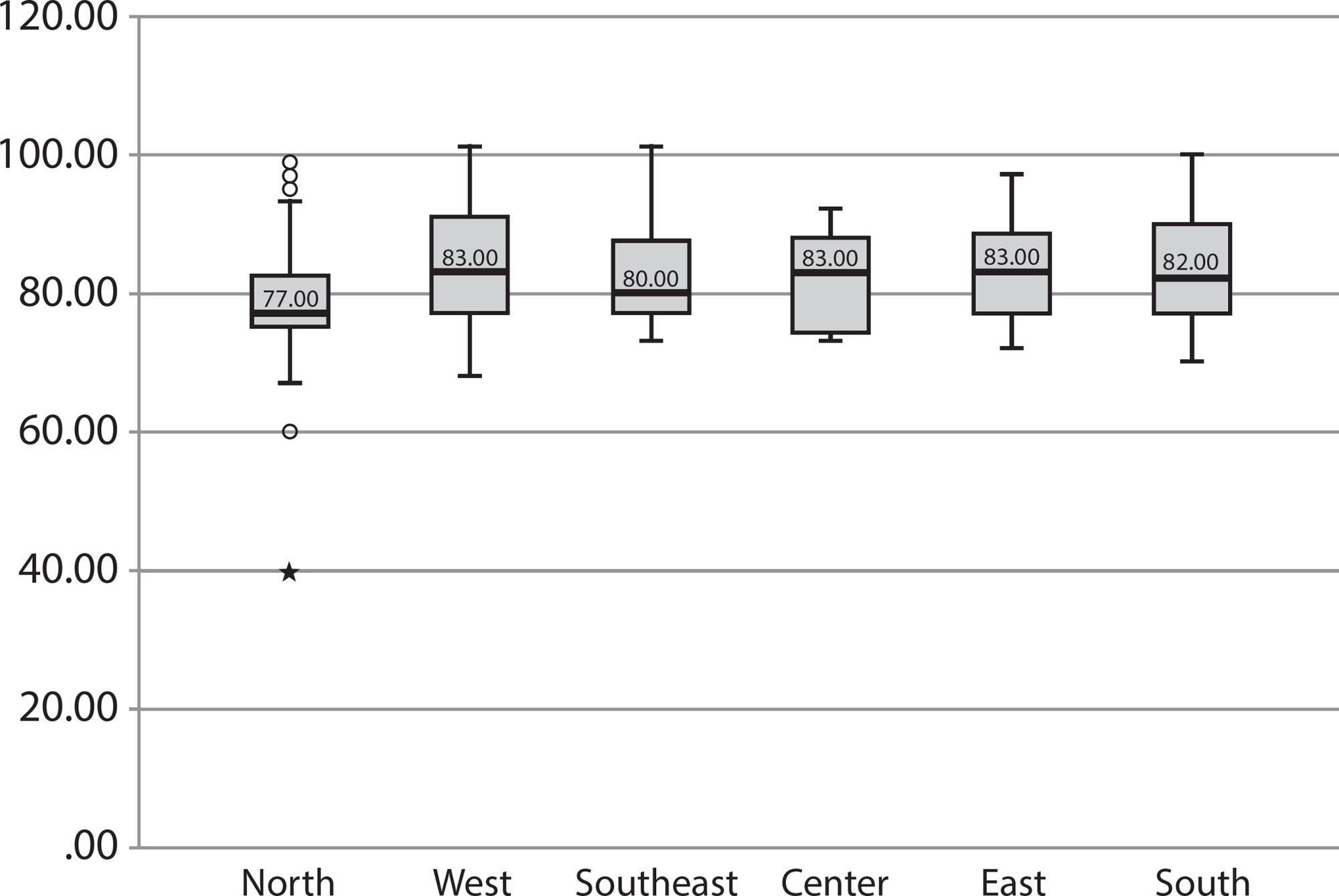-
01-01-2015
Risk classification in pediatrics: development and validation of a guide for nurses
Revista Brasileira de Enfermagem. 2015;68(5):913-922
Abstract
Risk classification in pediatrics: development and validation of a guide for nurses
Revista Brasileira de Enfermagem. 2015;68(5):913-922
DOI 10.1590/0034-7167.2015680521i
Views0See moreABSTRACT
Objective:
to develop and validate a short guide for the protocol to user embracement with risk classification in pediatrics.
Method:
methodological study developed in two stages: development of the guide, and face and content validation. The development involved the stratification of the protocol contents into five risk indicators according to the level of complexity; subsequently it was submitted to validation by nine experts divided in two groups: professors who were also researchers, and nurses.
Results:
in the face validation the experts considered the 25 items of the guide clear and understandable, with agreement levels above 70%. In the content validation, 17 (68%) items were considered relevant by 88.9% of the experts. The eight items considered irrelevant were changed according to suggestions of the experts, yielding an overall content validity index of 0.98.
Conclusion:
the study resulted in a guide for the classification of risks in pediatrics that is valid to assess children in emergency services.

-
01-01-2015
Components of social learning theory in a tool for teaching Nursing
Revista Brasileira de Enfermagem. 2015;68(5):906-912
Abstract
Components of social learning theory in a tool for teaching Nursing
Revista Brasileira de Enfermagem. 2015;68(5):906-912
DOI 10.1590/0034-7167.2015680520i
Views0See moreABSTRACT
Objective:
to identify key components of the social learning theory in a computational tool to aid in teaching the reasoning process for the preparation of a nursing diagnosis.
Method:
qualitative study that analyzed the statements collected through a focus group of 18 teachers and students from two Brazilian nursing schools.
Results:
the themes were grouped into four categories related to the components of the theory and into 13 subcategories.
Conclusion:
the meaning of learning can be extended by the teacher’s didactics and corroborated by the relationship between systematization and reasoning. To learn by doing, some prerequisites are required as is a process of motivation and qualification, which are also inherent to learning by forming an identity in the group. In the feeling of belonging to a particular group, aspects related to the profession become visible as opposed to the aspects of belonging to a community of practice of learning.

-
01-01-2015
Telephone call for post-discharge surveillance: validation and application of tool for video-assisted surgery
Revista Brasileira de Enfermagem. 2015;68(5):899-905
Abstract
Telephone call for post-discharge surveillance: validation and application of tool for video-assisted surgery
Revista Brasileira de Enfermagem. 2015;68(5):899-905
DOI 10.1590/0034-7167.2015680519i
Views0See moreABSTRACT
Objective:
to validate an instrument for post-discharge surveillance by telephone for video assisted surgeries.
Method:
a multi-method study with development, validation and application of the instrument. The validation was performed by experts considering the relevance, clarity and completeness of the contents in the calculation of the content validity index and valid questions that demonstrated 80% agreement. For the application of the instrument, the sample consisted of 68 women undergoing video-assisted surgery, and we conducted a descriptive analysis.
Results:
there was disagreement among experts in the first evaluation, and the instrument was redesigned obtaining agreement in the second evaluation. The response rate to the telephone contact was 88.2% (60/68). Complaints of abdominal pain, bleeding and incisional edema were more frequent. No patients presented with infection.
Conclusion:
the questionnaire was validated and applied and is available for use.
-
01-01-2015
Managerial competences of coordinators of undergraduate nursing courses
Revista Brasileira de Enfermagem. 2015;68(5):890-898
Abstract
Managerial competences of coordinators of undergraduate nursing courses
Revista Brasileira de Enfermagem. 2015;68(5):890-898
DOI 10.1590/0034-7167.2015680518i
Views0See moreABSTRACT
Objective:
to analyze the experiences of how the managerial competences of coordinators, ideal and real, of undergraduate nursing course coordinators from the city of Belo Horizonte, Minais Gerais.
Method:
the theoretical framework presented a conceptual model of eight managerial roles (director, producer, monitor, coordinator, mentor, facilitator, broker and innovator) and three specific competences to the exercise of each one of them. Descriptive and qualitative research with 14 interviews conducted using semi-structured scripts, whose data were subjected to content analysis.
Results:
we highlighted the roles: mentor, director and facilitator as the most prominent, whose competences can be continually improved as a result of differentiated and permanent demands which the subject face, in addition to the natural ambiguities and contradictions of management function.
Conclusion:
the higher education institution can adjust their selection and evaluation processes for this position, including the difficulties of professional competences training required in the exercise of managerial function.

-
01-01-2015
Family participation to elderly rehabilitation with femoral fracture
Revista Brasileira de Enfermagem. 2015;68(5):883-889
Abstract
Family participation to elderly rehabilitation with femoral fracture
Revista Brasileira de Enfermagem. 2015;68(5):883-889
DOI 10.1590/0034-7167.2015680517i
Views0See moreABSTRACT
Objective:
verify if the mode of care adopted by caregivers favored functional independence recovery by elderly with and without the presence of nervous system disease and mental and behavioral disorders; and, if disease interfered with their functional independence.
Method:
transversal study, with 12-month follow-up of 89 Brazilian elders (≥ 60 years) after proximal femoral surgery, and their family caregiver.
Results:
the Functional Independence Measure scores decreased by 0.7 points per year of life, and in the case of presenting nervous system disease and mental and behavioral disorders, this loss amounted to 20.5 points.
Conclusion:
The incentive to ambulate increased by 18.8 for self-care, 12.8 for self-care, and 11.5 for leisure activities on the Functional Independence Measure. Encouraging movement and ambulation, self-care and leisure activities, especially with those elderly with nervous system diseases and mental and behavioral disorders, is recommended.
-
01-01-2015
Participação familiar para a reabilitação de idosos com fratura de fêmur
Revista Brasileira de Enfermagem. 2015;68(5):883-889
Abstract
Participação familiar para a reabilitação de idosos com fratura de fêmur
Revista Brasileira de Enfermagem. 2015;68(5):883-889
DOI 10.1590/0034-7167.2015680517i
Views1See moreRESUMEN
Objetivo:
verificar si el modo de cuidar adoptado por los cuidadores favoreció la recuperación de la independencia funcional de los ancianos con y sin la presencia de enfermedad en el sistema nervioso y trastornos mentales y comportamentales y si enfermedades interfirieron en la independencia funcional.
Método:
estudio trasversal, con seguimiento por 12 meses de 89 ancianos brasileños (≥ 60 años), sometidos a cirugía de fémur proximal y sus cuidadores familiares.
Resultados:
los scores de la Medida de Independencia Funcional disminuyeron 0,7 puntos por año vivido y, en el caso de enfermedad en el sistema nervioso y trastorno mental y comportamental, esa pérdida aumentó para 20,5 puntos. El incentivo a la deambulación aumentó 18,9, al autocuidado 12,8 y al ocio 11,5 puntos de la Medida de Independencia Funcional.
Conclusión:
se recomienda el incentivo al movimiento y a la deambulación, al autocuidado y a las actividades de ocio, principalmente en aquellos ancianos con enfermedades en el sistema nervioso y trastorno mental y comportamental.
-
01-01-2015
Absenteeism – illness of the nursing staff of a university hospital
Revista Brasileira de Enfermagem. 2015;68(5):876-882
Abstract
Absenteeism – illness of the nursing staff of a university hospital
Revista Brasileira de Enfermagem. 2015;68(5):876-882
DOI 10.1590/0034-7167.2015680516i
Views0See moreABSTRACT
Objective:
to analyze absenteeism – illness of the nursing staff.
Method:
this was a retrospective study of a university hospital in the city of Goiânia, Goiás, Brazil, using a quantitative approach. Data were collected from functional records of the staff during the period from 2008 to 2012.
Results:
of 602 workers, 435 had 1574 medical certifi cates. Diseases of the musculoskeletal system and connective tissue, followed by mental and behavioral disorders were the major diseases for sick leave. The occupation with the highest number of medical certifi cates was the nursing technician. Females and the age group between 41-50 years prevailed in the sample. Ambulatory was the area with most frequent events, followed by the medical clinic and emergency room.
Conclusion:
absenteeism-illness affects the functioning of the service, the nursing staff and users, promoting work overload, and interfering in the quality of nursing care.
-
01-01-2015
The nurse faced with early weaning in child nursing consultations
Revista Brasileira de Enfermagem. 2015;68(5):869-875
Abstract
The nurse faced with early weaning in child nursing consultations
Revista Brasileira de Enfermagem. 2015;68(5):869-875
DOI 10.1590/0034-7167.2015680515i
Views0See moreABSTRACT
Objective:
analyze the role of the nurse regarding early weaning in children younger than 6 months old.
Method:
qualitative and descriptive study. The nurses who performed the study did nursing consultation to children programmatically in family health units in Cuiabá – Mato Grosso. Data were collected in January and February 2012, through participant observation of nursing consultations. For data analysis, content analysis was used.
Results:
that nurses, in most cases, used appropriate strategies for the management of common problems in breastfeeding, although some behaviors have not yet proven scientifi c evidence about the benefi ts and/or damage to its practice.
Conclusion:
nurses addressed important aspects of breastfeeding during consultations and worked for the promotion and resumption of exclusive breastfeeding.
-
REVIEW07-17-2020
Approaches to workload in psychiatric and mental health nursing
Revista Brasileira de Enfermagem. 2020;73:e20190620
Abstract
REVIEWApproaches to workload in psychiatric and mental health nursing
Revista Brasileira de Enfermagem. 2020;73:e20190620
DOI 10.1590/0034-7167-2019-0620
Views0See moreABSTRACT
Objective:
to investigate approaches to workload in psychiatric and mental health nursing in Brazilian and international production of knowledge
Methods:
integrative literature review using six databases, covering January 2005 to March 2019. Articles in full in English, Spanish and Portuguese were included.
Results:
the sample consisted of 23 original articles classified as quantitative or emotional. The quantitative dimension was addressed in 12 articles and included: assessing patient care needs, identifying activities performed by the team, measuring time spent and developing and validating a measurement instrument. The emotional dimension included 11 articles the focus of which was on identifying stressors in the workplace, psychosocial risks and coping strategies.
Conclusion:
strategies were found for measuring workload and assessing the impact of stressors on nursing teams.
-
ORIGINAL ARTICLE05-18-2020
Women in situations of sexual violence: potentialities and weaknesses of the intersectoral network
Revista Brasileira de Enfermagem. 2020;73(4):e20190856
Abstract
ORIGINAL ARTICLEWomen in situations of sexual violence: potentialities and weaknesses of the intersectoral network
Revista Brasileira de Enfermagem. 2020;73(4):e20190856
DOI 10.1590/0034-7167-2018-0856
Views0See moreABSTRACT
Objectives:
to identify potentialities and weaknesses of the intersectoral network for women in situations of sexual violence, from the perspective of Intervention Bioethics and the Universal Declaration on Bioethics and Human Rights.
Methods:
qualitative study conducted with multidisciplinary team members who work in intersectoral care services for women subject to sexual violence. It was held in a municipality in southern Brazil. An intentional sample, totaling 30 professionals. Semi-structured interview was used from January to April 2016. Interviews were analyzed by Thematic Analysis.
Results:
two categories emerged: potentialities and weaknesses related to the intersectoral network. Potentialities confirm the importance of the articulated intersectoral network; weaknesses such as lack of organized flow and disarticulation of services result in women revictimization and care fragmentation.
Final Considerations:
it is necessary to articulate services and qualify professionals. The Intervention Bioethics and the Universal Declaration on Bioethics and Human Rights foster discussions that contribute to how to organize and sustain the intersectoral network.

-
ORIGINAL ARTICLE07-10-2020
Mental Health Nursing: waiting room intervention in integral health care
Revista Brasileira de Enfermagem. 2020;73:e20180886
Abstract
ORIGINAL ARTICLEMental Health Nursing: waiting room intervention in integral health care
Revista Brasileira de Enfermagem. 2020;73:e20180886
DOI 10.1590/0034-7167-2018-0886
Views0See moreABSTRACT
Objective:
To describe and to analyze the proposal for intervention in the waiting room as a possibility for Nursing in mental health in group context.
Method:
Descriptive study with a qualitative approach, convergent care type, developed in a Psychosocial Care Center for Alcohol and Drugs in the interior of the state of Goiás.
Results:
The service in the waiting room provided moments of reflection, knowledge, learning, listening and exchanging experiences.
Final considerations:
The meetings in the waiting room favored the articulation between theoretical knowledge and the practice of nursing care in groups, constituting a space with a valuable locus for the development of educational and support actions in health services, to be undertaken by the nurse and, also, by other professionals of the health team.
-
ORIGINAL ARTICLE08-10-2020
Risk management in the scope of nursing professionals in the hospital setting
Revista Brasileira de Enfermagem. 2020;73(6):e20190303
Abstract
ORIGINAL ARTICLERisk management in the scope of nursing professionals in the hospital setting
Revista Brasileira de Enfermagem. 2020;73(6):e20190303
DOI 10.1590/0034-7167-2019-0303
Views1See moreABSTRACT
Objective:
To evaluate occupational hazards affecting nursing professionals’ health in the environment of the hospital.
Method:
Descriptive-exploratory research with a qualitative approach.
Results:
The main hazards affecting nursing professionals were work overload due to the large number of patients or the small number of professionals, inadequate infrastructure, and insufficient organizational management. It became evident the work interferences in the nursing professional’s life are enormous. Despite the existence of health occupational risk management, there is still a shortage of bigger endeavors to be employed in the hospital routine. As a main result of the study, a Standard Operational Protocol (SOP) for biological risk was created to be applied in a hospital setting.
Conclusion:
Based on the identification of occupational hazards, it was suggested the Standard Operational Protocol which should be standardized to manage biological occupational hazards, to ensure the adequate flow of procedures after the exposure, as well as the occupational safety of nursing professionals.

-
ORIGINAL ARTICLE07-06-2020
Time and quality of admissions: nursing workload
Revista Brasileira de Enfermagem. 2020;73(5):e20190267
Abstract
ORIGINAL ARTICLETime and quality of admissions: nursing workload
Revista Brasileira de Enfermagem. 2020;73(5):e20190267
DOI 10.1590/0034-7167-2019-0267
Views0See moreABSTRACT
Objectives:
to measure the average time spent by the nursing staff during patient admission and investigate their compliance with the activities described by the Nursing Interventions Classification; evaluate the degree of interference in the workload of the team.
Methods:
observational with time measurement through software. We followed 199 admissions made by the nursing staff in seven units, using two validated instruments. Total scores ≥ 70% and 50% validated the process.
Results:
the average time of nurses ranged from 5.5 (standard deviation = 2.3) to 13 (standard deviation = 1.1) minutes; and the auxiliary / technician, between 4.7 (standard deviation = 2.1) and 6.8 (standard deviation = 2.0) minutes (p ≤ 0.01). We qualified six admissions made by nurses and 33 by assistants/technicians. The intervention spent 16.3% to 31.5% of the working hours of the team.
Conclusions:
admission impacts nursing workload and needs to be considered both in the measurement of activities and in the sizing of the nursing staff.
-
ORIGINAL ARTICLE09-21-2020
Nurses’ attitudes facing the family involvment in caring for people with mental disorder
Revista Brasileira de Enfermagem. 2020;73:e20200041
Abstract
ORIGINAL ARTICLENurses’ attitudes facing the family involvment in caring for people with mental disorder
Revista Brasileira de Enfermagem. 2020;73:e20200041
DOI 10.1590/0034-7167-2020-0041
Views0See moreABSTRACT
Objective:
To characterize the attitudes of Primary Health Care nurses, regarding the involvement of the family in the care for people with Mental Disorder.
Methods:
Correlational study with 257 nurses from the city of São Paulo. The scale “Importance of Families in Nursing Care- Nurses’ Attitudes” was used. For the analysis, descriptive and inferential statistics were used.
Results:
The scale scores were high, with a mean value of 82.1 (SD=8.4) favorable to the families’ involvement, and are related to being a nurse in the Family Health Strategy (p<0.001), having received education/training in family nursing (p<0.005), the workload of 40 hours/week (p<0.005), working in the West, East and Center Regions (p<0.005).
Conclusion:
Most nurses have positive attitudes towards the involvement of families, a relevant indicator for their inclusion in the health-mental care process.

-
07-09-2021
Algorithm for transitional care for caregivers of dependent older adults: a validation study
Revista Brasileira de Enfermagem. 2021;74:e20200625
Abstract
Algorithm for transitional care for caregivers of dependent older adults: a validation study
Revista Brasileira de Enfermagem. 2021;74:e20200625
DOI 10.1590/0034-7167-2020-0625
Views0See moreABSTRACT
Objective:
To construct and validate an algorithm for transitional care for caregivers of dependent older adults.
Method:
This was a methodological study developed in three phases: a literature review, designing an algorithm, and its validation by a peer panel with twenty-seven experts selected according to pre-defined inclusion criteria.
Results:
The algorithm predicted interventions in transitional care (hospital stay, at discharge, and 30 days at home post-discharge) aimed at the exercise of the caregiver role; needs assessment; training in care management of dependent older adults and management of self-care, and ensuring continuity of care (of older adults and caregivers).
Conclusion:
Agreement between expert raters and a reliability test of 0.92 indicate that the algorithm can be used by professionals to decide the transitional care interventions to be administered to the caregivers of dependent older adults. Future studies should be conducted to perform its clinical validation.

-
REVIEW07-14-2021
Stress level experienced by participants in realistic simulation: a systematic review
Revista Brasileira de Enfermagem. 2021;74(4):e20201151
Abstract
REVIEWStress level experienced by participants in realistic simulation: a systematic review
Revista Brasileira de Enfermagem. 2021;74(4):e20201151
DOI 10.1590/0034-7167-2020-1151
Views0See moreABSTRACT
Objectives:
to identify the available evidence regarding stress levels experienced by participants in education based on a realistic simulation.
Methods:
systematic review that included randomized clinic trials on electronic databases: Cumulative Index to Nursing and Allied Health Literature, Cochrane Library, Latin-American and Caribbean Literature in Health Sciences, LIVIVO, PubMed, Scopus, and Web of Science. The additional search was performed on Google Scholar and OpenGrey. All searches occurred on September 24, 2020. The methodologic quality of the results was evaluated by the Cochrane Collaboration Risk of Bias Tool.
Results:
eighteen studies were included, which evaluated the participants’ stress using physiologic, self-reported measures, or the combination of both. Stress as experienced in a high level in simulated scenarios.
Conclusions:
evidence of the study included in this systematic review suggest that stress is experienced in a high level in simulated scenarios.

Search
Search in:
Nuvem de Tags
Adolescente (85) Atenção Primária à Saúde (239) COVID-19 (91) Criança (91) Cuidados de Enfermagem (269) Educação em Enfermagem (151) Educação em Saúde (139) Enfermagem (930) Enfermagem Pediátrica (86) Estudantes de Enfermagem (77) Estudos de Validação (131) Família (87) Idoso (208) Promoção da Saúde (99) Qualidade de Vida (104) Saúde do Trabalhador (86) Saúde Mental (145) Saúde Pública (82) Segurança do Paciente (150) Tecnologia Educacional (100)



